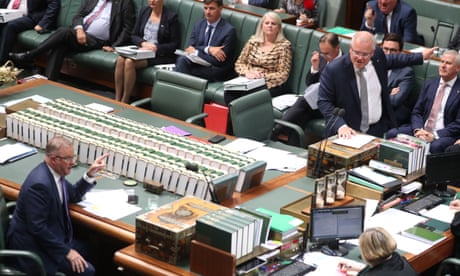Australian War Memorial volunteers told they could lose role if they speak publicly about controversial expansion
Warning not to ‘like’ social media comments comes as critics declare $500m redevelopment excessive and unnecessary
The Australian War Memorial warned volunteers they would lose their jobs if they speak publicly or “like” social media comments about its controversial $500m expansion project.
The memorial has faced much public scrutiny over its costly redevelopment plans, which include demolishing and rebuilding the award-winning Anzac Hall and creating a glass area to house large objects such as an F/A18 Hornet, reconnaissance aircraft, and armoured vehicles.
Critics, including former memorial directors, say the redevelopment is excessive, unnecessary and “totally inappropriate”.
Earlier this month, an email from a memorial staff member was sent to a distribution list for family history volunteers, which directed them not to speak publicly about the redevelopment.
The email, first reported by the Canberra Times, warned that doing so could cost volunteers their jobs.

Under the subheading “We are all public servants”, the memorial warned: “This is a timely reminder that as Memorial volunteers you should not publically [sic] comment on the development.
“This includes not providing comment on radio via talk back shows, commenting in the newspaper such as in the Letters to the Editor section, or commenting on a link or discussion on such social media as Facebook or Twitter.
“This includes not clicking ‘Like’ to someone else’s comment.”
The email, seen by Guardian Australia, acknowledged the project had divided the memorial community and that there had been “been a lot of media attention on the television, radio, newspapers and social media applications, about the development going on at the Memorial”.
But it said volunteers were obliged through their “volunteer agreement”, a document signed each year, to act with integrity and within the public service values and code of conduct.
The agreement also obliged volunteers to “maintain confidentiality” for any information acquired through volunteering duties. The email said that confidentiality extended to making media comments.
“Public servants, including volunteers are all bound by these, and can lose our job if we are found to have breached them,” the email said. “This also means you can lose your volunteer role at the Memorial.”

One volunteer who spoke to Guardian Australia said he was “annoyed” by the email. It made a mockery of a sign outside the memorial declaring “for we are young and free”.
“I thought how much freedom have we got like they mention on the front of the war memorial?” he said.
He said he believed the money should be redirected to support veterans, a view shared by former war memorial directors, anti-war campaigners and experts.
“I’m scared it’s going to be made into a Luna Park or a fairground,” he said.
A spokesman for the AWM has previously said the project would not come at the cost of funding for veterans’ welfare.
“This is not a case of one or the other, but a commitment to both,” he said.
The memorial says the expansion is necessary to better tell the story of modern conflict, display more of its collection, house “planes, helicopters and armoured vehicles” inside galleries, and relieve circulation pressures caused by high visitor numbers.
Read the original article HERE

Comments
I think that could be a good strategy on research for archives and artistic programs as well.
It is not clear who issued the directive about public comment - was it the AWM director or someone else? - but I find it an appalling action by the AWM, of all organisations. We fought wars and people gave their lives to protect freedom of speech and the right we all have as Australians to express our opinions, especially about taxpayer-funded projects and public institutions. It's bad enough to forbid staff members to express personal views in the public interest - but to try and gag volunteers in this way is extraordinary. It simply emphasises what a weak case there is in favour of this project, and the deceptive way it had been pushed forward by the government. Of the 70-plus submissions on the website of the Public Works Committee enquiry, some of them very weighty indeed, only about half a dozen actually support the project and (in my opinion) not very convincingly. The letters traffic in the Canberra Times has been similarly critical of the project.
When I read this news I was reminded of Chips Rafferty's speech in FORTY THOUSAND HORSEMEN (1941) where he muses about what Australias are fighting for in the war - among other things it's for "the right to stand up on a soapbox in the domain". But it seems that doesn't apply if you are a volunteer at the AWM.
It's the contradiction between what the AWM stands for and what it is now doing that shocks me.